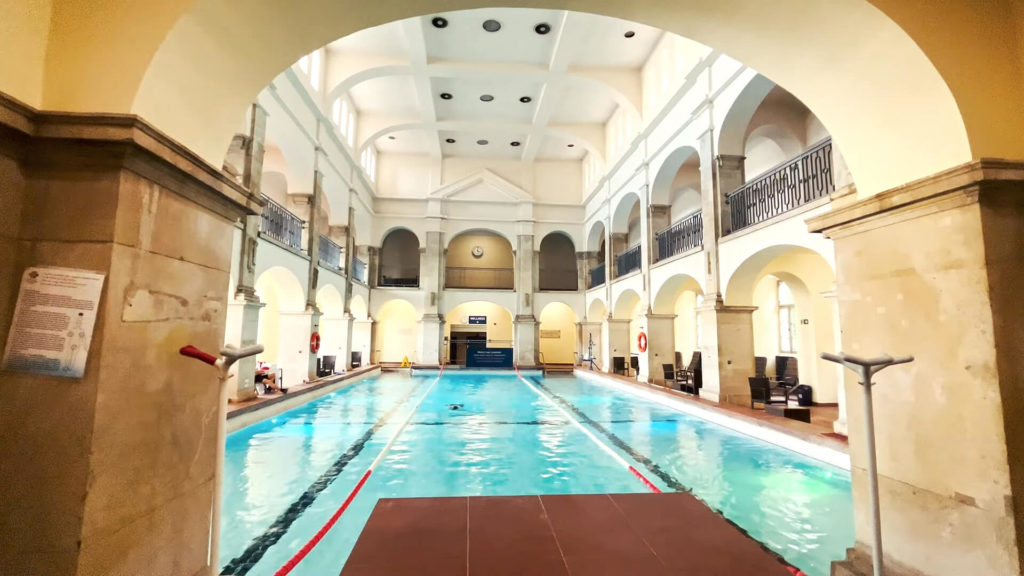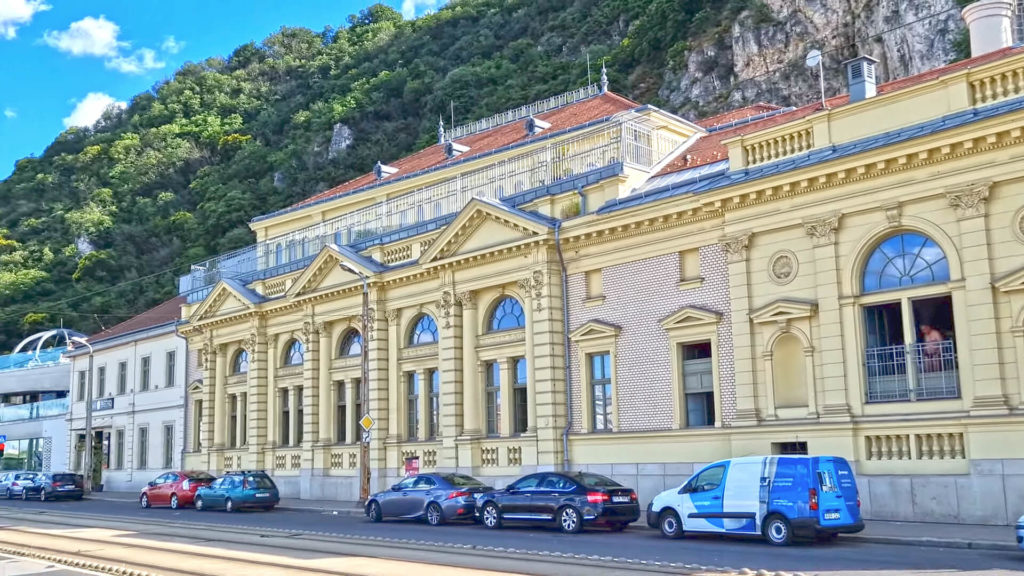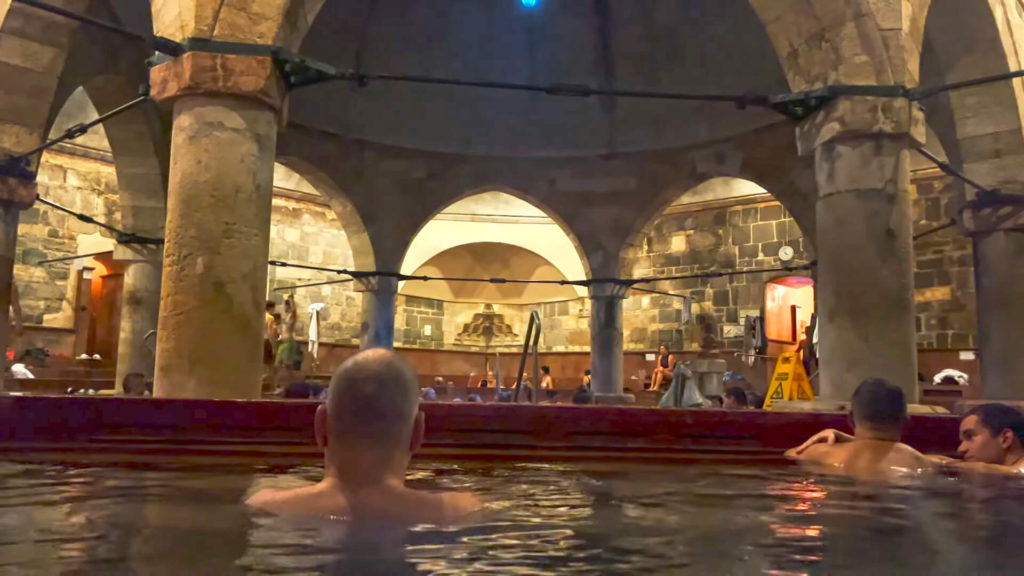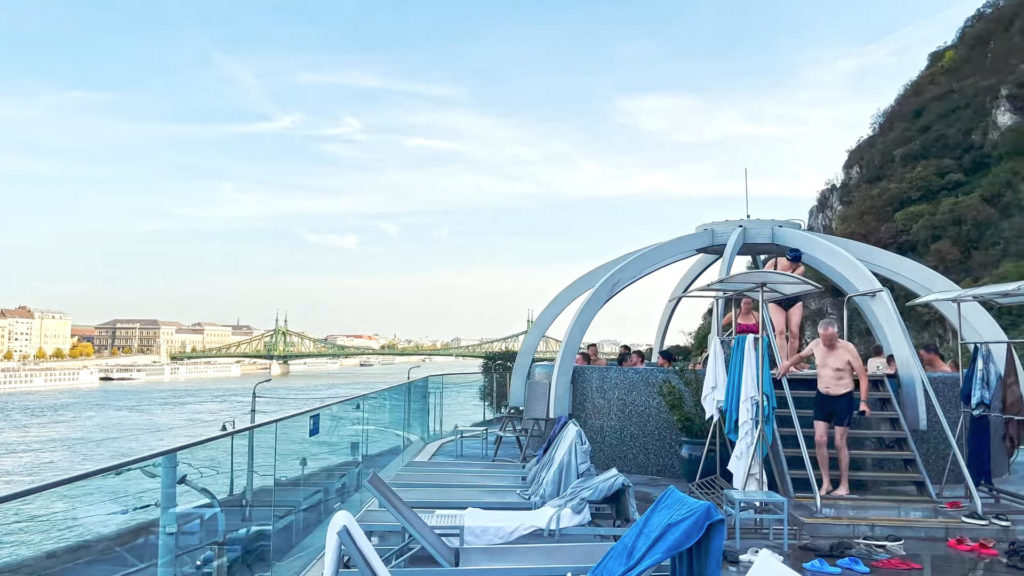Rudas Thermal Bath in Budapest

Location
- Address: Budapest, Döbrentei tér 9, 1013 Hungary
- Phone: +36203214568
- Website: www.rudasfurdo.hu
Working Hours
| Monday | 6am – 8pm |
| Tuesday | 6am – 8pm |
| Wednesday | 6am – 8pm |
| Thursday | 6am – 8pm |
| Friday | 6am – 8pm |
| Saturday | 6am – 8pm |
| Sunday | 6am – 8pm |
Pools
Turkish bath
| Large thermal pool | 36 °C |
| Thermal pool 1 | 28 °C |
| Thermal pool 2 | 30 °C |
| Thermal pool 3 | 33 °C |
| Thermal pool 4 | 42 °C |
| Cold pool | 16 °C |
Wellness area
| Seated thermal pool 1 | 32 °C |
| Seated thermal pool 2 | 36 °C |
| Juventus pool | 42 °C |
| Cold pool | 11 °C |
| Roof pool | 36 °C |

The History of Rudas Thermal Bath
The Rudas Thermal Bath has a long and fascinating history that spans over 800 years. The bath’s history can be traced back to the 13th century when the Knights of St. John built a hospital and bathhouse on the site. However, it was during the Ottoman occupation that Rudas Thermal Bath took its current form. The bath was built in the 16th century by Sokollu Mehmed Pasha, the Grand Vizier of the Ottoman Empire. The main hall of the bath was constructed in 1566 and boasts an Ottoman octagonal pool and four water pools at various temperatures, all covered by a traditional 10-meter Turkish-style dome held up by eight pillars.
Over the years, the bath underwent several renovations and expansions, with the most significant renovation taking place in 1896. During this renovation, a new therapeutic pool and sauna were introduced to the building. The last renovation took place during the twenty-first century, reopening at the beginning of 2006. Today, the Rudas Thermal Bath is a popular tourist destination and a favorite among locals.

The Architecture and Design of Rudas Thermal Bath
The architecture and design of Rudas Thermal Bath are a testament to the Ottoman influence on Hungary. The bath’s main hall features an Ottoman-style octagonal pool and traditional Turkish-style dome held up by eight pillars. The domed ceiling has a series of stained-glass windows that allow natural light to filter into the room, creating a colorful and vibrant effect inside the pool.
The bath’s south extension is a modern area that was completely renovated in 2014. This modern area features a hot rooftop pool that offers stunning panoramic views of the Danube. The rooftop pool is the perfect place to relax and unwind while enjoying the beautiful views of Budapest.
The Pools and Services at Rudas Thermal Bath
The Rudas Thermal Bath offers visitors a range of pools and services that cater to their needs. The bath has six thermal bath basins and four wellness pools with temperatures ranging from 11 °C to 42°C. The hottest pools at Rudas Thermal Bath are the two pools at 42 °C, making it the “Extreme” spa in Budapest.
The bath also offers various medical and wellness services such as massages, medical tub baths, and underwater jet massages. Visitors can also enjoy Hungarian fusion cuisine at the Rudas Bistro restaurant on the first floor.
Bathing Etiquette at Rudas Thermal Bath
The Rudas Thermal Bath has specific bathing etiquette that visitors must follow. The bath used to be mainly open to men, and to this day, men can exclusively enjoy the Turkish pools on Monday, Wednesday, Thursday, and Friday till 10.45. Tuesday is only for female visitors, and they can use the steam pools during the opening hours of 6.00 – 20.00. From 11.00 am on Friday and the whole of Saturday and Sunday, both genders can enjoy the bath.
Visitors must also adhere to the dress code at Rudas Thermal Bath. Wearing a swimsuit is obligatory during the weekend, but from Monday to Friday, it is not compulsory. Visitors are advised to bring their own towels, slippers, swim cap, and swimwear as purchasing them at the bath can be quite expensive.

The Prices and Timings at Rudas Thermal Bath
Like other thermal baths in Budapest, the prices at Rudas Thermal Bath are relatively complicated and vary depending on the day and time of the visit. Visitors can purchase a daily ticket to all zones for 6,500 HUF on weekdays and 8,500 HUF on weekends/holidays. The daily thermal ticket costs 4,500 HUF and is only available on weekdays, and the wellness spa ticket costs 4,500 HUF and is also available on weekdays.
The bath is open every day from 6 am to 8 pm, and the sauna and steam bath are open from 6 am to 8 pm on weekdays and from 10 pm to 4 am on weekends. Men can exclusively visit the spa on Mondays, Wednesdays, Thursdays, and Fridays, while women can visit the spa on Tuesdays. The bath is mixed on weekends, and night swimming is available on Fridays and Saturdays from 10 pm to 4 am.
Why Visit Rudas Thermal Bath?
The Rudas Thermal Bath is a unique blend of old-world charm and modern amenities. Visitors can experience the rich history and culture of Budapest while enjoying a relaxing and rejuvenating spa experience. The bath’s architecture and design are a testament to the Ottoman influence on Hungary, and the hot rooftop pool offers stunning panoramic views of the Danube.
Visitors can also enjoy a range of pools and services, including massages, medical tub baths, and underwater jet massages. The bath’s bathing etiquette and dress code add to the overall experience, making it a unique and authentic way to explore Budapest’s culture and history.
FAQs
What are the Rudas Thermal Baths?
The Rudas Thermal Baths are a historic bathhouse in Budapest, dating back to the 16th century when Budapest was under Ottoman rule. The Baths are known for their impressive Turkish dome and octagonal pool, as well as the modern wellness facilities.
